POLITENESS AND BUSINESS HIERARCHY IN BUENOS AIRES SPANISH
UBER, DIANE
THE COLLEGE OF WOOSTER
DEPARTMENT OF SPANISH
Dr. Diane Uber
Department of Spanish
The College of Wooster.
Politeness and Business Hierarchy in Buenos Aires Spanish
Synopsis:
Data from Buenos Aires, Argentina illustrate that instructional practices for students of Business Spanish must include the concepts of hierarchy, respect and politeness. Norms of politeness dictate that one should be accommodating toward the addressee. This can be manifest in the form of the respectful, deferential usted. Alternatively, politeness also can dictate informal (vos) usage toward those sharing equal social status, or to show confidence and solidarity toward the consumer.
Politeness and Business Hierarchy in Buenos Aires Diane R. Uber Department of Spanish The College of Wooster Spanish
Diane R. Uber Department of Spanish The College of Wooster
I. Data from Buenos Aires
Data from fieldwork in workplaces inBuenos Aires, Argentina will illustrate someissues that are important for training futureemployees in international business.
Practical application
Instructional practices for students of Business Spanish must include the concepts of hierarchy, respect and politeness.
II. Hierarchy
The hierarchy of a business must be understood in order to avoid misunderstandings.
Smaller businesses
When entering a business, visitors are received by someone of lower rank. For example, when visiting a dentist’s office, after I rang the bell, the receptionist came down to street level to receive me. After she took me up in the elevator to the dentist’s office, she brought me tea and cookies. When I had finished observing, she took me down in the elevator and said goodbye at the door to the street.
Larger companies
When entering a larger business, visitors are received by someone of lower rank and then guided from one department to another by a supervisor, who then asks the supervisor of the next department to resume the hosting activity. For example, in a company that provides systems and computing technology for banks (processing letters and data processing), I was received by the security guard, who called the branch supervisor, who then came down to receive me. He kissed me on the cheek, and addressed me with the informal pronoun vos. As he escorted me to each
department, he identified the supervisor, who was to “host me” and then let him know when I was finished in that department and wanted to move on to the next department.
Hierarchical structure of small, informal companies
All companies, even small, informal ones whose employees are all under thirty, exhibit a clear hierarchical structure, as manifested by employee roles in the workplace. Employees of lower rank may open the door, bring beverages for visitors, and escort them out.
Example of hierarchy of small, informal company
For example, I visited a small graphic design company of only four employees, two of whom were about 30 years old and students of my friend. However, because they outranked a younger employee of about 25 years, who was not a student of my friend that had set up the visit, this younger employee was expected to come down to street level when I rang the bell, to receive me, to escort me up to the office, and to bring me refreshments. First, he brought me a pitcher of water. When the conversation turned to mate, the tea frequently drunk by Argentines, he served me mate. Upon my departure, he was expected to escort me down to street level and let me out. All of the employees were dressed in jeans and T-shirts or hooded sweat shirts, and classic rock music was playing during the several hours that I spent there. Thus, even in this casual setting, hierarchies are well defined.
III. Respect
– Address forms (second-person pronouns and verb forms) reflect the concepts of respect and politeness in the workplace. In Buenos Aires:
– Usted + its verb forms=formal address
– Vos + its verb forms=informal address
Age, rank
With greater age and higher rank in the workplace comes respect, which would dictate usage of the more formal address (usted).
(Lack of) Familiarity or solidarity
– People with whom a worker is not acquainted are also addressed with usted. This is especially common for employees addressing clients. On the next page is an example of a survey, brought to clients at a rather expensive restaurant, which uses usted:
– ayúdenos
– su presencia
– verlo
– llegó usted
– Le gustaría
– déjenos sus datos
Survey:
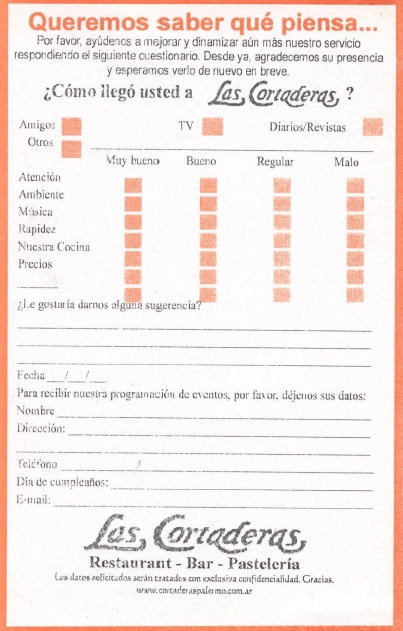
Experiment
– The investigator (who was 58 at the time and from the United States) experimented with informal (vos) usage to address some employees younger than she, but many continued to address her with usted. Some employees said that they are incapable of using vos with someone they respect.
– One exception was the female bartender at the hotel where I stayed for five weeks. Eventually, she began to vacillate between usted and vos to address me.
IV. Politeness
– Norms of politeness dictate that one should be accommodating toward the addressee.
– This can be manifest in the form of the respectful, deferential usted, as shown in the examples above.
– Alternatively, politeness also can dictate informal (vos) usage toward those sharing equal social status, or to show confidence and solidarity toward consumers that are assumed to be from the Buenos Aires area.
Examples of address switching in marketing
– Examples from marketing and advertising will illustrate these different usages geared toward different target audiences.
– For example, subway tickets use usted for instructions that riders should keep the ticket:
Conserve esta tarjeta en buen estado.
– However, advertisements on the ticket use vos to address consumers, with whom the business wishes to establish some feeling of unity.
An advertisement for a chain of movie theaters shows usted on rider instructions.

The detail of the above advertisement for a chain of movie theaters uses vos: vas al cine, vas a Hoyts.

An ad for a cell phone company uses vos: tu teléfono, cambiate a Metrotel ivoz., Comunicate con nosotros, ¿tenés ivoz?
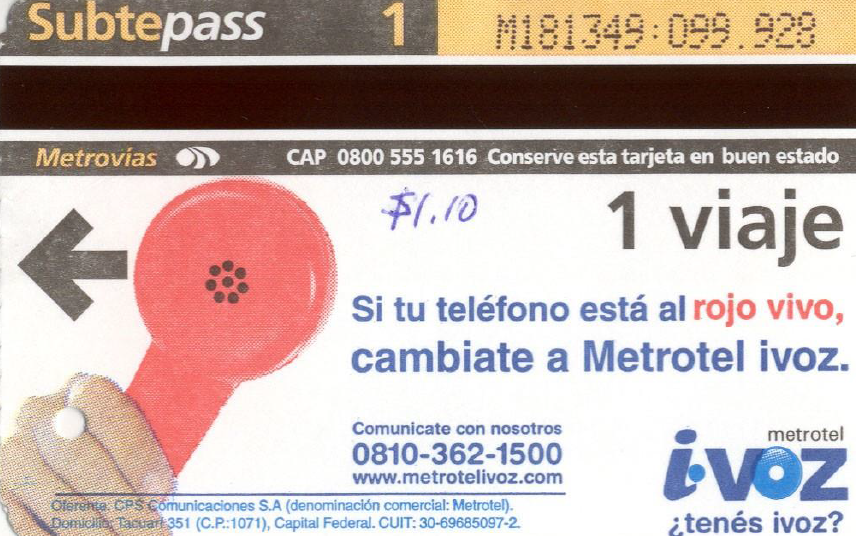
An ad for a pre-loaded credit card also uses vos: conocé

An ad for a travel web site shows vos: Llevá tu cuerpo a donde está tu mente.
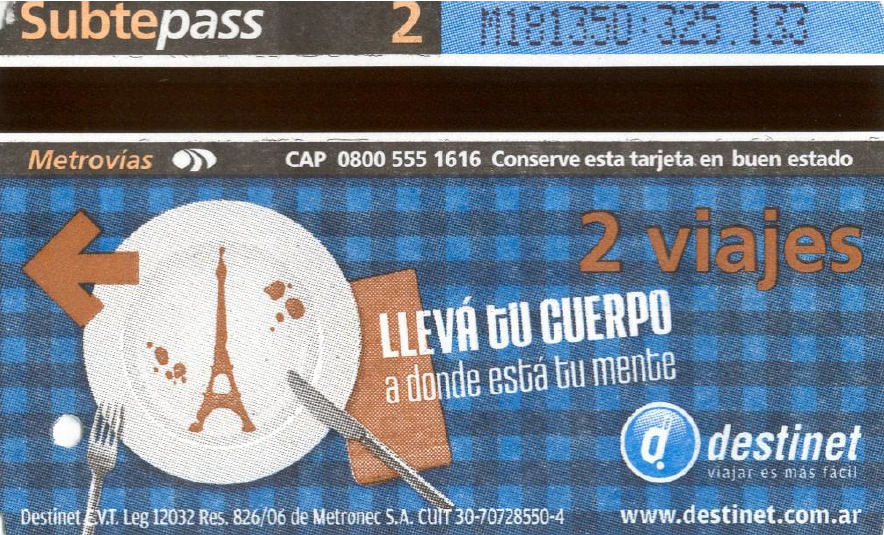
In contrast, a place mat from a restaurant that attracts an older clientele uses usted: Disfrute…
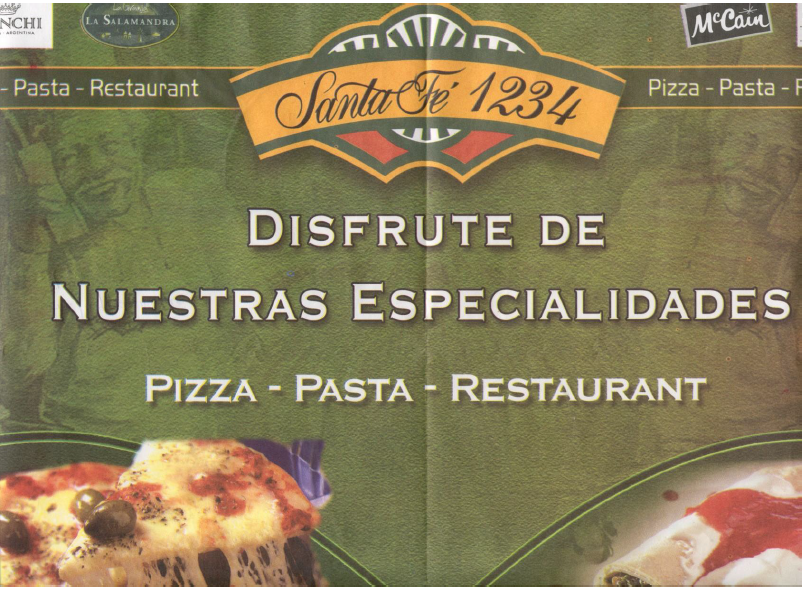
The program from an informal peña (restaurant with performances of Argentine folk music) uses vos:
Podés…

The program from an informal peña (restaurant with performances of Argentine folk music) uses vos:
Podés…

A menu for a caterer of informal, at-home pizza parties uses vos:
(The detail is shown on the next page.)

The detail of the catering menu
Vos disfrutás…tus invitados…

Full pizza menu
(The detail is shown on the next page.)
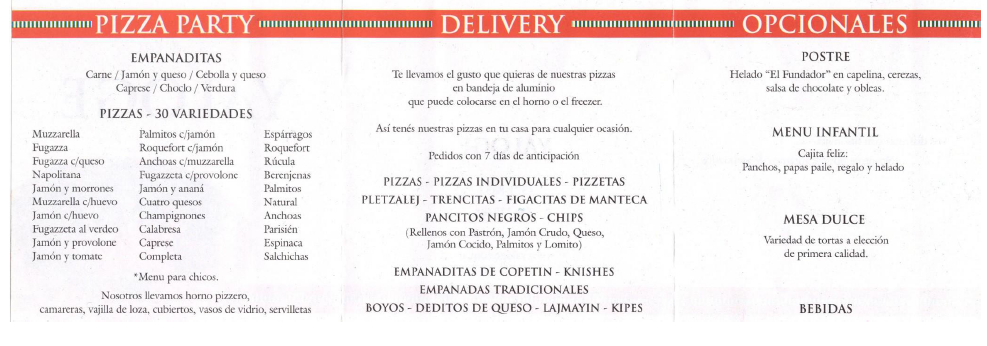
The detail of the catering menu
Te…quieras…. …tenés…tu casa….

v.Conclusions
– Businesses, both small and large, and both formal and informal, are more hierarchical in Spanish- speaking countries.
– Respect is shown by the usage of formal address directed to distinguished or older clients or to the general public (negative politeness).
– A switch from usted to vos in the same document can foster group identity (positive politeness) when that segment of the document is directed toward speakers of the Spanish of Buenos Aires.
VI. Acknowledgements
– Thanks to the Faculty Research and Study Leaves program at The College of Wooster for approving my one-year research leave.
– The Henry Luce III Fund for Distinguished Scholarship assisted with my travel expenses.
– Several professionals and business people permitted me to visit and observe in their workplaces.
– Finally, my most profound thanks to Soledad López Gambino and her parents, Jorge López and Carolina Gambino for facilitating most of my contacts in both the city and province of Buenos Aires.
VII. References
– Brown, Penelope y Levinson, Stephen C. 1987. Politeness: some universals in language usage (Studies in Interactional Sociolinguistics 4). Cambridge: Cambridge University Press.
– García, Carmen. 1992. Refusing an invitation: A case study of Peruvian style, Hispanic Linguistics, 5: 207-243.
– Kaul de Marlangeon, Silvia. 2010. Voseo, ustedeo y cortesía verbal en folletos de propaganda argentinos, en Martin Hummel, Bettina Kluge y María Eugenia Vázquez Laslop (eds.), Formas y fórmulas de tratamiento en el mundo hispánico. México, D.F.: El Colegio de México: 993-1011.
– Uber, Diane R. 2010. Formas y fórmulas de trato en situaciones laborales en Santiago de Chile y Buenos Aires, en Martin Hummel, Bettina Kluge y María Eugenia Vázquez Laslop (eds.), Formas y fórmulas de tratamiento en el mundo hispánico. México, D.F.: El Colegio de México: 1051-1080.
– Uber, Diane R. 2011. Forms of address: the effect of the context, en Manuel Díaz-Campos (ed.), The handbook of Spanish sociolinguistics (Blackwell Handbooks in Linguistics) Oxford: Blackwell: 244-262.
– Uber, Diane R. 2014. Spanish Forms of Address in Advertising and Marketing Documents in Madrid: Respect and Politeness.” Proceedings of the 2014 Hawaii University Conference on Arts, Humanities and Social Sciences, Honolulu, HI, January 4-6, 2014. ISSN 2162-9188 CD-ROM and ISSN 2162-917X online.
